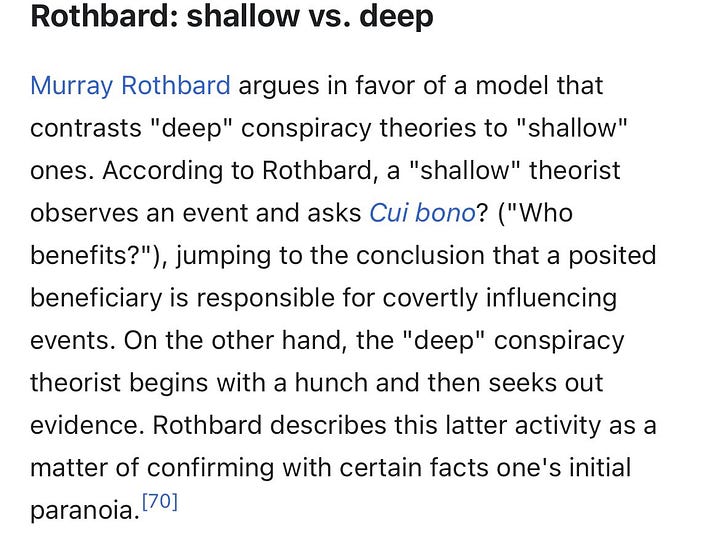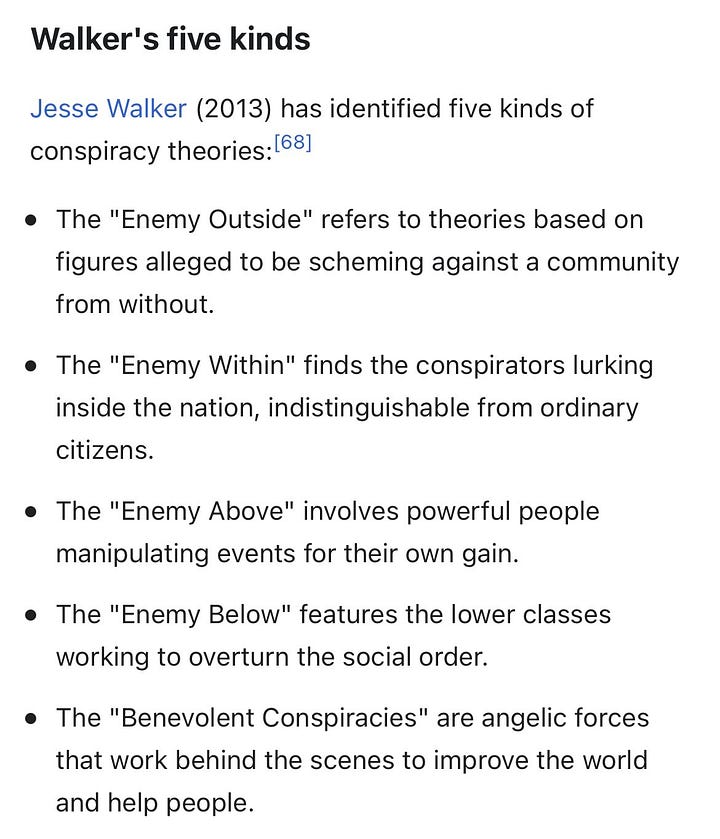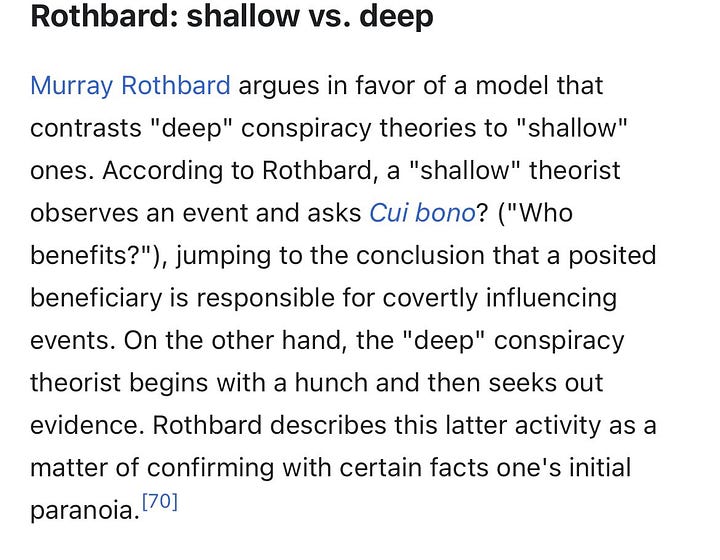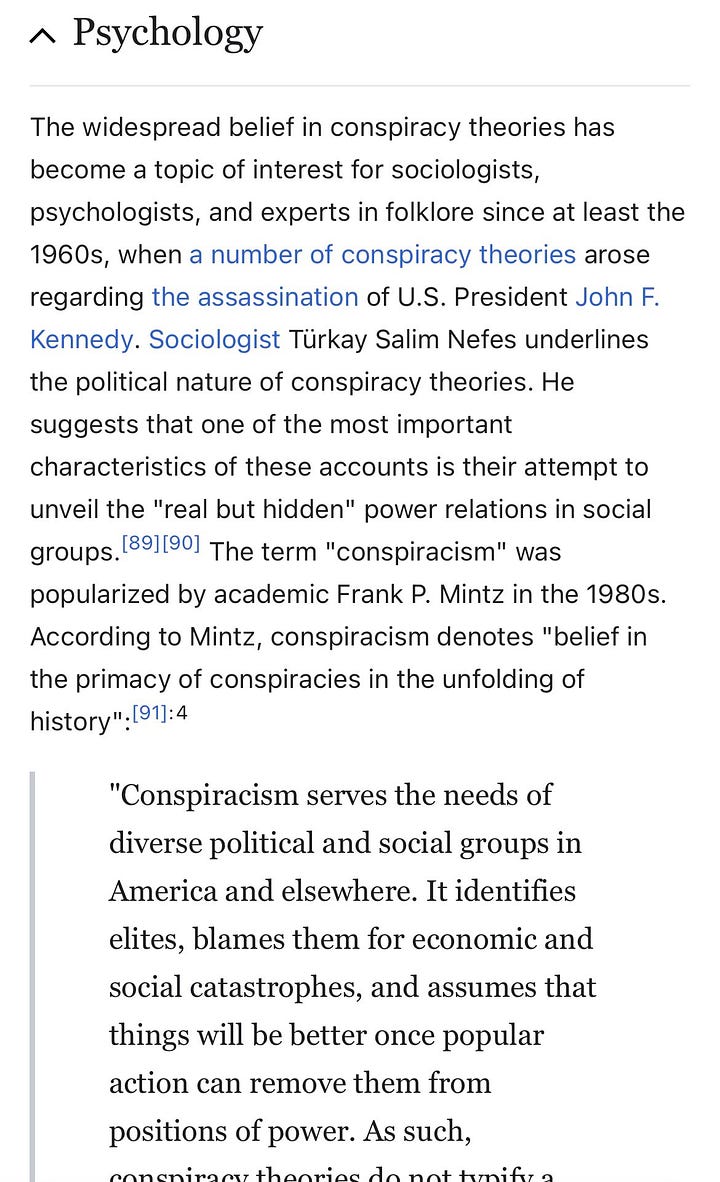If your idea isn't a conspiracy theory in the pejorative sense, then argue that. Don't claim "conspiracy theory" doesn't mean what it means
I’m tired of seeing conspiracy theorist Plandemic-ers pointing to virologists, medical doctors and investors and telling me, “You clearly don’t know anything about this!” These Klaus-Schwabbers are as bad as the Lockdowners saying, “You don’t know The Science!” Invariably, the “experts” pushing the Plandemic conspiracy theories have no expertise in making sense of complex emergent phenomena, much less among masses of brimming-with-fallacies humans. They look as ridiculous as I would if I were to talk about the details of vaccine science or heart disease.
But, my aim in today’s substack is not to argue against the many conspiracy theorist Plandemic types on my anti-Lockdown side, but to instead address a bizarre obsession they have with claiming that “conspiracy theory” doesn’t mean what it in fact does.
“Conspiracy theory” means what it means, and it’s NOT a theory about conspiracies. It’s an idiom, and means something different than just the combination of the two words. (‘Basket case’ is another example.)
“Conspiracy theory” is used to refer to a common human fallacy in reasoning. In the sense used in sociopolitical contexts, it means:
Conspiracy theory: a radically tangled and complex Occam’s-Razor-smashing hypothesis, that usually over-explains some subset of the evidence, concerning a super-secret and super-powerful organization that manages to coordinate a massive variety of complex events, whereas there are usually many astronomically simpler hypotheses that explain the evidence. In model terms, conspiracy theories are theories that use way too many parameters, and have thereby over-fitted the data.
I talk about it in this earlier Science Moment…
And people need to stop pretending they don’t know that this is what it means. So many insist to me, “Oh, no, it simply means a theory about a conspiracy.”
Are they really claiming to believe that people are using “conspiracy theorist” pejoratively, and yet all they mean by it is, “Your theory is about multiple people working together toward some end”? How could that even be pejorative! Pretty much every idea in the sociopolitical arena concerns people working together toward ends.
People are angry at being called a “conspiracy theorist” because they know that the sense in which it’s being used is the way I fleshed it out above.
They show they know what it truly means when they work to “own” the term, saying things such as, “Well, so far, 9 out of 10 of my conspiracy theories have turned out true.” It’s funny. And the reason it’s funny is that it’s making the point that the person’s ideas were not in fact conspiracy theories at all. They were actually reasoned, elegant, evidence-based hypotheses, ones that were incorrectly and pejoratively called “conspiracy theories.”
So, no. They do know what it means.
Does the fact that their opponents are sometimes mis-applying the term mean that “conspiracy theory” no longer means what it does?
No. The Left has been calling anyone that disagrees with them a “racist” for a couple generations now, but does that mean “racist” doesn’t mean what it does?
Ok, how about it being a terrible term because, you know, the CIA invented it?
So what if the CIA did! It ends up meaning what it does by the mass action of culture. None of us can change that. And, if the CIA didn’t coin the term, there would just be another word to refer to the same kind of bad theory humans are prone to believing. (And, at any rate, the CIA did not coin the term. It can be found with the same pejorative meaning going back at least to 1870.)
Yes, the Lockdowners have called any counter-narrative view as a conspiracy theory. My response is to argue why it’s not a conspiracy theory; to argue that my theory is simple, elegant, plausible, consistent with the data, not over-fitting, etc. My response is NOT to claim that they’re accusing me of making hypotheses about multiple people working together toward an end, and how dare they! And my response is NOT to claim that that term should never ever be used because I don’t like where I perceive the word to have come from. Don’t be squirrely.
~~
There are, as it happens, entire areas of academic research trying to understand the human propensity to believe in conspiracy theories. Here’s just a few examples…




And, I myself am part of that world. In addition to studying complex emergent phenomena among human societies (which I often talk about here and in my Science Moment series), I have been deeply involved in understanding fallacious human reasoning, and reasoning generally. Here’s one of my biggest discoveries, my solution to the Riddle of Induction, from a couple decades ago, Chapter 3 from my first book, Brain From 25,000 Feet.



I don’t agree with your assertion that “conspiracy theory” has been used as a pejorative for 150 years. In fact it’s not in the authoritative 1892 dictionary.
Also Chatty G could be cajoled to affirm as much when asked the question “What did conspiracy theory mean in 1892?”:
The term "conspiracy theory" did exist in 1892, but its meaning was slightly different from how it is commonly used today. At that time, the term was primarily used to describe a legal concept, referring to the idea that two or more people could be charged with conspiring to commit a crime, even if the crime itself was never actually carried out.
In other words, "conspiracy theory" in 1892 referred to a criminal charge, rather than a belief or explanation for an event that is not supported by evidence. It wasn't until much later, in the mid-20th century, that the term began to be used more broadly to refer to theories about secret plots or schemes by powerful people or organizations.
I've said, "it's interesting that so many 'conspiracy theories' turn out being true." If I understand your point that would be the same as, but more accurately argued that, "it's interesting that so many snubbed hypotheses end up being proven."
Which, yes, often happens in history when those in power and the commoners have a belief system challenged, like say, the earth is flat and the sun orbits the earth. Conspiracy theorists in the same category as heretics. Until their theories become widely accepted as true. Is that the type of distinction you're making?
A big factor in this is linguistics. And the struggle over language. Controlling the language, the terms used in a debate for advantage. And one side of the ideological and philosophical debate has proven to be very effective at controlling the language.
It's not an accident of history that one of the most influential voices found on the traditional left over the past 50 years, Noam Chomsky, is a professor of linguistics. He had generations of eager, young, idealistic followers who leaned into his teachings. His values they shared expressed in words that gave them more power to shake up the existing power structure. Using carefully calibrated linguistics.
Orwell embraced this in his novels as "Newspeak." It's all around us now. It always was, but today the campaign of Newspeak is inescapable. Words being reappropriated to gain advantage in the eternal struggle for power. And it's happening without much pushback. The only opposition strategy that's had much success has been taking a term meant as a pejorative and wearing it as a badge or mocking it and turning it around as a pejorative in the other direction. Like, "Deplorables" and "woke." A linguistic jujutsu.
These times are as much about linguistic battles for power over the minds of the body politic as any other battle in a broader ideological and philosophical struggle for power.
The Body Politic: Body, Language, and Power
National Council of Teachers of English, 1990
https://sci-hub.se/https://doi.org/10.2307/377544
We most certainly live in interesting times. How do those of us who share closer ideologies and philosophies get better at linguistics, which seems to be a source of contention in using terms like "conspiracy theories."